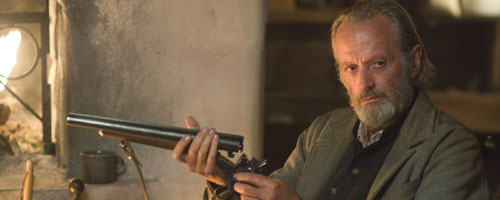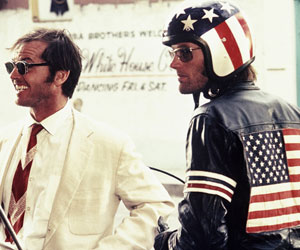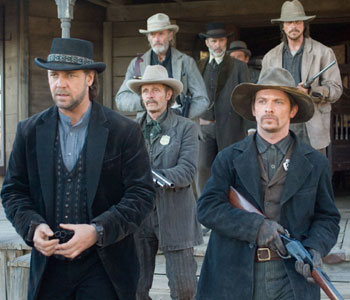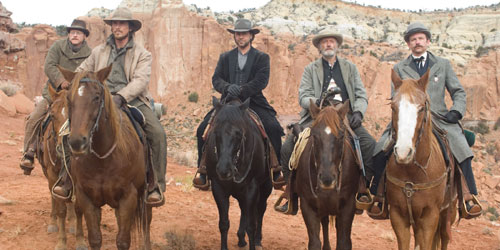|
|
|
| |
 |
|
|
| |
| |
Peter Fonda: an Easy Rider goes to Yuma
Interview by Gary Dean Murray
To be honest, one does not interview Peter Fonda. No, Peter Fonda talks and you listen. If you are lucky enough to find an opening, a question can be broached. In the thirty minutes we spent in conversation at the Adolphus Hotel in Dallas, there were maybe half a dozen queries. The rest of the time Peter just talked about whatever struck his fancy, letting ideas and concepts dance around like notes of freeform jazz. It was a fascinating experience. This maverick of cinema has been in the business forever and his family is one of the true dynasties of Hollywood. His father was one of the greatest movie actors of all time, Henry Fonda. Peter even calls his acting in The Grapes of Wrath Ďgeniusí. His sister Jane has been a controversial icon of cinema for decades. His daughter Bridget was in the business until the birth of her child. Peter confided that she might be planning a comeback to the big screen now that her child is older.
But he is in town to discuss his latest project 3:10 to Yuma, a Western starring Russell Crowe and Christian Bale. The film is about a poor rancher trying to bring justice to his small world by bringing in a bad guy. The film is based on a short story by Elmore Leonard and was a major motion picture in 1957. But, this update expands the story, adding different elements. James Mangold, the director behind Walk the Line, Heavy, and Girl, Interrupted takes the cast through their paces. Peter plays a supporting role of Byron McElroy. His character is a Pinkerton protector and bounty hunter that is assigned to make sure that Ben Wade (Russell Crowe), a gang leader, doesn't escape justice. With local rancher Dan Evans (Christian Bale) by McElroy's side, they defy the odds and make sure that the bad man is going to be on the 3:10 train to Yuma to prison. The character did not exist in the original story or the first film. But it was there in terms to understand the motivations of the situation, stated Fonda. In this story, the bad guy isnít totally bad and the good guy does have his demons. Peter's agent and publicity people knew about the movie and the character, but Fonda still had to win the part. "I just wanted to work with Jim Mangold and I liked Westerns" said Fonda. "I went down to meet him and showed him that I have great energy to play this man of Plympton steel." He also said that he got the role "Because I was able to get there,", since he had recently moved back to LA from Montana. "I earned the role," is what he said about getting the part. "Our business is based on perception and performance. Perception is on 'in town' as a player. Performance is what I have to give up when I hear 'Action'. Had I not been in town, I would not have been able to get in that car and drive quickly down to Mangold's and have a little breakfast with him and show him I have great energy." The concept of acting energy took Peter Fonda in a tangent thought about his dad, Henry. He said that his father was a 'hands down' performer, meaning that, "He didn't use his hands to gesticulate. All his tension was between his fingers." This thought led to the power of acting on screen. Fonda said, "By keeping it down and low you have more to go, you can say more power by being down than by being up. You can deliver more snake by being down than up. Look at Al Pacino in The Godfather. He was down all the way until he slammed his hand on the table. Man, did we all jump. That went someplace. I know from my experience as an actor that Gary Cooper adage that if I know what I'm doing I donít have to act. I wrote Easy Rider and knew what I was doing from the get-go." He used John Wayne as an example of this acting style. "John Wayne a very underrated actor as far as I am concerned," Peter said. "When I met this guy (as a child) I didnít know who he was but he had this great charisma. He was a beautiful young actor. The character arc he played in his roles from She Wore a Yellow Ribbon to The Searchers to Red River were amazing. When John won the Academy Award, he said 'All I had to do was put a patch over my eye.'" By watching him, Peter said that you learn how to play the Duke in fifty different ways. In one scene Peter's character says, crawling toward his shotgun, "Is that you missy? If you're gonna kill me you just as soon get to it." Peter felt was very much in the Duke manner, using John Wayne's style that was so effective when delivered. "Close-up stuff," he called it, "hands down stuff." Peter felt the words "I rode in here, I sure as hell can ride out" were character definitive lines.
Fonda had nothing but high praise for his cast, hailing Russell Crowe a very generous actor. He called acting a dance and "We have to do that dance together. If you donít step on each others toes, we can help each other and work together." Admitting that he nominated Christian Bale for his role in the film Empire of the Sun, he compared that young performance to Tatum O'Neal in Paper Moon. Fonda said, "He was very intense and very cool." On Gretchen Mol, Peter Fonda said, "I didnít know she was going to be in the film and when I heard it I thought 'This is terrific'. Her character was absolutely necessary to show what was going to be conflicted inside Christian's character. We also needed her to be there and show that little moment of understanding that Ben Wade is not as bad as everyone makes him out to be. Remember he's a sketch artist and he wants out of this life of crime. That is a pretty dramatic turn." He praised her work in the Betty Page movie. Finally when asked about the disappearing state of the Western film, Peter Fonda said, "There is a loss but it is not something that cannot be reclaimed. You look at Unforgiven. How do you explain the success? Everyone told Kevin Costner you can't do (Dances with Wolves), you can't do that, you canít do that. And he was 'the little engine that could'. Open Range was a good Western. He was told that cowboy movies, Western movies donít make money. I think that this one will make money and there is a chance that more Westerns will be made." 3:10 to Yuma opens September 7, 2007
Visit the official Lionsgate 3:10 TO YUMA movie website by clicking here. | |
|
This site is best viewed with Internet Explorer at a screen size of 1024x768 All content © 2007 BIGFANBOY.com
|

 But Peter Fonda is a legend in his own right. His film Easy Rider,
where he worked both sides of the production, is considered a
masterpiece of 1960s cinema. He co-wrote the film, which was nominated
for two Oscars. His Captain America character has achieved icon
status. This little film that became a generation defining
experience. But he is more than a one-note performer. Some of the
films he has been a part of are The Wild Angels, Futureworld,
Outlaw Blues, and Cannonball Run. His 1997 film Ulee's
Gold received much critical praise and awards. He was last seen on
screen in Wild Hogs.
But Peter Fonda is a legend in his own right. His film Easy Rider,
where he worked both sides of the production, is considered a
masterpiece of 1960s cinema. He co-wrote the film, which was nominated
for two Oscars. His Captain America character has achieved icon
status. This little film that became a generation defining
experience. But he is more than a one-note performer. Some of the
films he has been a part of are The Wild Angels, Futureworld,
Outlaw Blues, and Cannonball Run. His 1997 film Ulee's
Gold received much critical praise and awards. He was last seen on
screen in Wild Hogs. Peter talked about John Wayne and others in Hollywood coming over to the
house to play an old Western card game. "I'd be watching them because
they had my cap gun on the table because they needed a six shooter to
play a Western card game," he said. "Randolph Scott, Ward Bond, John
Ford and John Wayne. So I got to know characters that were great
Western actors and took that into my own Western ethic when I got to
play characters in the West. When I got to direct my first film (Hired
Hand), which was a Western I used this ethic. I didnít intend to do it.
I didnít even know I was going to do a Western. I read a script and it
had great characters and this is what we look for (as a director). I
got to be a part of this."
Peter talked about John Wayne and others in Hollywood coming over to the
house to play an old Western card game. "I'd be watching them because
they had my cap gun on the table because they needed a six shooter to
play a Western card game," he said. "Randolph Scott, Ward Bond, John
Ford and John Wayne. So I got to know characters that were great
Western actors and took that into my own Western ethic when I got to
play characters in the West. When I got to direct my first film (Hired
Hand), which was a Western I used this ethic. I didnít intend to do it.
I didnít even know I was going to do a Western. I read a script and it
had great characters and this is what we look for (as a director). I
got to be a part of this."


